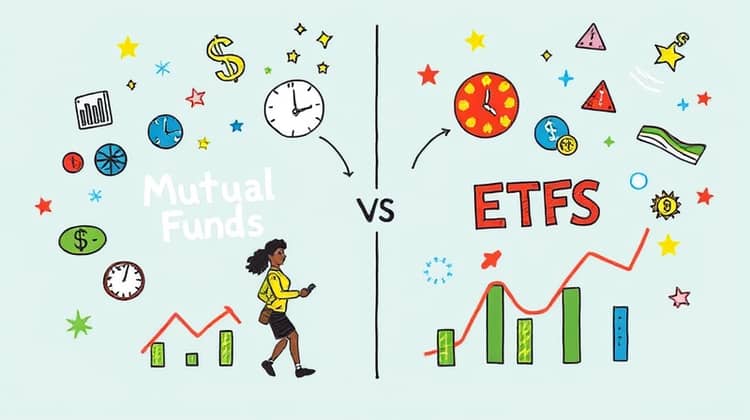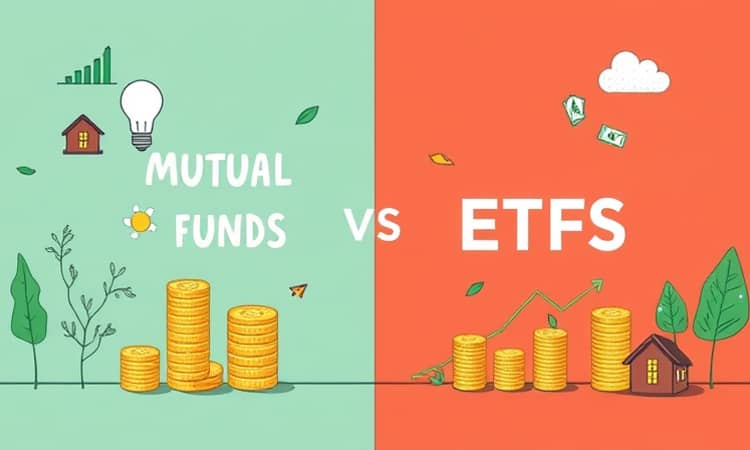In the world of investments, investors often find themselves weighing their options between various financial vehicles. Among these, Mutual Funds and Exchange-Traded Funds (ETFs) are two of the most popular choices. Each option provides a unique method for investment and comes with its own set of characteristics, advantages, and disadvantages.
This article aims to explore the key aspects of Mutual Funds and ETFs, helping investors understand their similarities and differences. By the end, you'll be better equipped to make informed decisions regarding which investment vehicle suits your financial goals best.
Understanding Mutual Funds

Mutual Funds are pooled investment vehicles that allow multiple investors to contribute funds to a collective pool, which is then managed by a professional investment manager. This manager allocates the fund's assets based on the specific investment objective and strategy laid out in the fund's prospectus.
Typically, investors buy shares of the Mutual Fund at the fund's net asset value (NAV), which is calculated at the end of each trading day. This allows investors to gain exposure to a diversified portfolio of stocks, bonds, or other securities without needing to buy each one individually.
- Professional management of investments
- Diversification reduces individual investment risk
- Variety of investment strategies and objectives
However, while Mutual Funds offer these benefits, they also come with fees and expenses that can impact overall returns.
Overview of ETFs

Exchange-Traded Funds (ETFs) are similar to Mutual Funds in that they are also pooled investment vehicles. However, ETFs trade on stock exchanges like individual stocks, allowing investors to buy and sell shares throughout the trading day at market-determined prices rather than the NAV.
ETFs often aim to track the performance of specific indices or sectors, offering a passive investment approach that can be more cost-effective than actively managed Mutual Funds. This trading flexibility is one of the critical features that separates ETFs from Mutual Funds.
- Traded on stock exchanges throughout the day
- Generally lower expense ratios compared to Mutual Funds
- Transparency in holdings with real-time pricing
The ability to trade ETFs like stocks makes them an appealing option for many investors looking for liquidity and quick access to their investments.
Similarities Between Mutual Funds and ETFs

Despite their differences, Mutual Funds and ETFs share some common ground that often leads investors to compare the two directly. Both investment vehicles allow for diversification by pooling investors' money to purchase a variety of securities, which can mitigate risk.
Moreover, both options provide access to professional management. This is particularly beneficial for those who may not have the time or expertise to manage their own portfolios effectively.
- Both involve pooling of investors' capital
- Provide access to a diversified investment portfolio
- Managed by professional investment managers
Understanding these similarities can help investors appreciate the benefits of each option in the context of their financial strategies.
Key Differences Between Mutual Funds and ETFs

Though they have overlapping features, Mutual Funds and ETFs diverge significantly in several aspects. One of the most notable differences lies in how they are traded. While Mutual Funds are bought and sold at the end of the trading day at the NAV, ETFs can be transacted at any time during market hours and fluctuate in price like stocks.
Another critical difference is in their fee structure. Mutual Funds often have higher fees, including management fees and loads, while ETFs typically offer lower expense ratios, making them more cost-effective for long-term investors. Additionally, investors in ETFs may incur brokerage fees when buying or selling, which should also be considered.
Finally, tax implications vary between the two. ETFs tend to be more tax-efficient due to their unique structure, which minimizes capital gains distributions compared to Mutual Funds.
Which Is Better? A Comparison

Determining whether Mutual Funds or ETFs are better requires a careful evaluation of individual investment goals, strategies, and preferences. For investors who prefer a more hands-off approach and are eager to employ professional management, Mutual Funds may be suitable.
On the other hand, for those looking for flexibility, cost-efficiency, and trading convenience, ETFs could be the preferred choice.
- Mutual Funds may suit long-term, committed investors
- ETFs are ideal for active traders and those seeking liquidity
- Evaluate personal financial goals before choosing
Ultimately, the best choice depends on the individual investor's circumstances and objectives.
Considerations for Your Decision

Investors must consider several factors when choosing between Mutual Funds and ETFs. Assessing investment objectives, such as growth, income, or diversification, is paramount. Understanding how each option aligns with these objectives will help in making a strategic choice.
Additionally, investors should evaluate their risk tolerance, as well as the time they are willing to commit to managing their investments. Those who are less involved may gravitate towards Mutual Funds, while those wanting a more active approach may prefer ETFs.
Conclusion

In conclusion, both Mutual Funds and ETFs offer valuable pathways to invest in various financial markets, and each has distinct advantages and disadvantages. Your choice should ultimately reflect your investing style, objectives, and the level of engagement you wish to maintain in managing your investments.
As financial markets continue to evolve, understanding these vehicles is crucial for any investor. A detailed knowledge of their workings can provide you with the clarity needed to navigate your investment choices successfully. By weighing the merits of both Mutual Funds and ETFs, you can make an informed decision that contributes to your financial goals.














